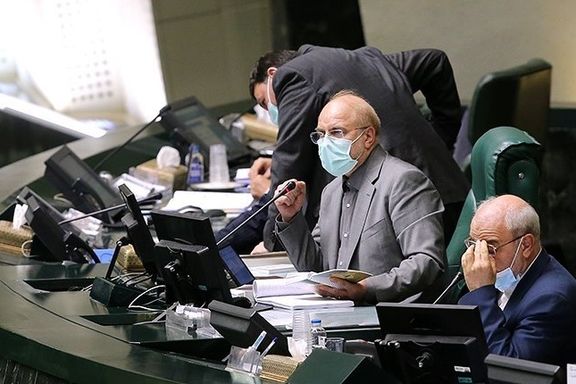Iran Lawmakers Criticize Runaway Cost of Living 'Tsunami'

Lawmakers on Sunday strongly criticized the unbridled rise in living costs in Iran, while officials try to blame the former government for the economic crisis.

Lawmakers on Sunday strongly criticized the unbridled rise in living costs in Iran, while officials try to blame the former government for the economic crisis.
Lawmaker Alborz Hosseini warned the president and his economic team in a speech Sunday about the rising cost of living. He called the daily increase in food prices a "tsunami" and added that rents were rising uncontrollably. "It seems that nobody is thinking of vulnerable classes."
"Food on people's tables is becoming scarcer by the day and cars have become a commodity they cannot hope to own," Fathollah Tavassoli, another lawmaker, told the Parliament.
In his pre-agenda speech Sunday, Parliament Speaker Mohammad-Bagher Ghalibaf blamed previous administrations for inflation which according to official figures has now risen above 40 percent and urged the government of President Ebrahim Raisi to take action to bring the hike in prices under control.
Ghalibaf, apparently still tries to protect Raisi from rising criticism, but others say blaming the former government is simply not an answer to the crisis.
Raisi has not been able to achieve much since last August when he took office, except more clandestine oil exports to China because of less strict US implementation of sanctions by President Joe Biden’s administration. Raisi government officials boast having doubled oil exports.
But many are now asking why higher oil sales have made no difference in the economy. The government mouthpiece, Iran newspaper, said this week oil revenues are spent to offset part of the 4.7 trillion rial budget deficit inherited from the government of former president Hassan Rouhani.
The newspaper argued that "Improvement in economic indices only through increasing oil exports is not feasible because other factors such as liquidity growth also affect indices such as the inflation rate.”
President Raisi and his hardliner supporters often openly or indirectly blame Rouhani for the long-running economic crisis. Raisi on Friday said "four years of inflation above 40% and negative economic growth rate" were the main reasons for the hike in prices.
But few people dare to say publicly that the long-running economic crisis is mainly the result of sanctions imposed by the United States over Iran’s nuclear program and a new deal is imperative for saving the economy.
According to official figures the annual inflation rate rose to over 40% in the previous Iranian calendar year that ended March 20. In the same year the rate of inflation for food was even higher at 51%. Inflation rate has only risen to above 40% twice in four decades in the history of the Islamic Republic.
In his televised speech to mark the Persian New Year on March 20, Supreme Leader Ali Khamenei admitted that Iranians had faced “hardships, high prices and inflation” in the previous year but said expecting the problems to go away quickly was not "realistic".
Pundits say blaming the country's multiple crises on Rouhani and will not resonate with the public, who understands that Raisi had eight months to make an impact on the situation, and he has failed.
In the past few days Iranian media have strongly criticized the government for what they say is inefficiency and ineptitude and highlighted the hike in the prices of food items such as rice, meat, and vegetables.
Domestically grown rice, for instance, has now become unaffordable to most families. According to data published by the Statistics Center of Iran (SCI), the price of various types of domestically grown rice has tripled in one year and risen by around 11% in March alone.